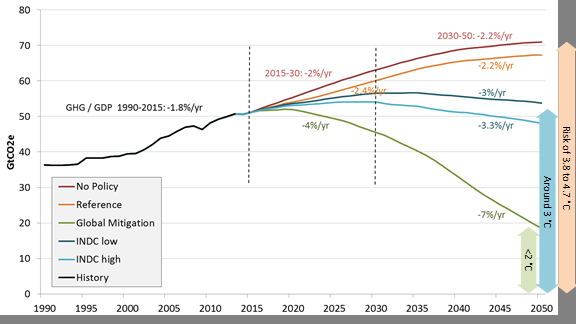Current climate commitments would increase global temperature around 3 C

155 countries representing around 90% of global emissions have submitted their Intended Nationally Determined Contributions (INDCs) on climate policy to the United Nations Framework Convention on Climate Change (UNFCCC) in preparation of the new climate negotiations to be held in December in Paris.
JRC's assessment of these initial proposals concludes that, if aggregated and fully implemented, unconditional INDCs (without international climate financial support or international cooperation mechanisms) could set global emissions growth at around 17% above 2010 level by 2030. Under EU's scenario to reach the global goal set by all Parties under the UNFCCC, i.e. limit global temperature increase to below 2ºC, global emissions would peak in 2020 and decline afterwards to 10% below 2010 levels by 2030.
When considering unconditional and conditional (with international climate financial support and other forms of international cooperation) INDCs combined, JRC finds that global emissions could peak shortly before 2030 at 12% above 2010 level. Assuming countries would keep on their efforts after 2030, these could limit the long term temperature increase to around 3° C.
This analysis was presented in the form of a policy brief as background information at the October preparatory meeting INDC Forum in Rabat.
More information: www.indcforum.org/wp-content/u … _201510_JRC97845.pdf
Provided by European Commission Joint Research Centre




















